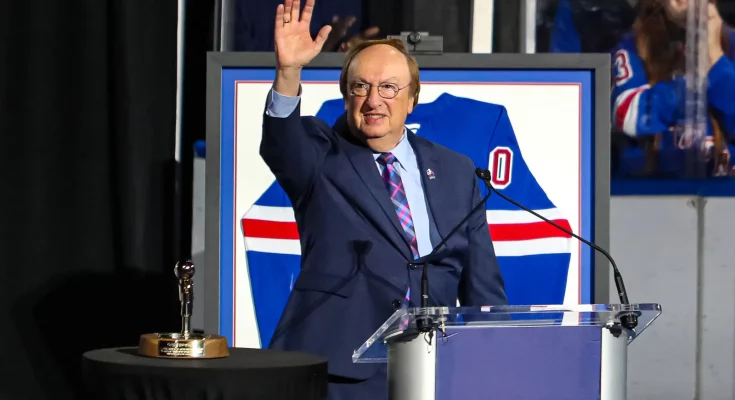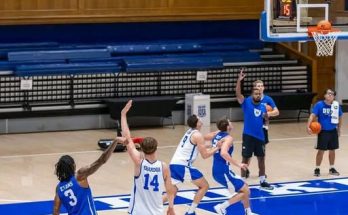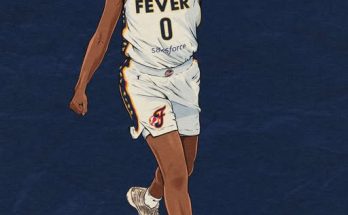The final call may have echoed, but the voice that defined generations of NHL fans isn’t disappearing into the shadows. Sam Rosen, the legendary broadcaster whose name has become synonymous with New York Rangers hockey and unforgettable NHL moments, has officially stepped away from his full-time broadcasting role. Yet in a twist that’s equal parts heartwarming and fitting, Rosen has no intention of leaving the NHL community entirely. Instead, the Hall of Famer is transitioning into a different phase of his storied career—one that keeps him close to the ice, close to the people, and close to the game he loves with unshakable fervor.
For over four decades, Rosen was more than just a voice on TV. He was the narrative thread tying together countless eras of hockey history. Whether it was a thrilling playoff run, a moment of heartbreak, or the kind of unexpected comeback that makes sports the theater it is, Sam Rosen was there to frame it all in words that cut through the noise and found their way into fans’ hearts. His chemistry with longtime partner Joe Micheletti was electric, and their voices became the soundtracks to the memories of countless Rangers fans across generations. Even fans of rival teams couldn’t help but admire the grace, professionalism, and sheer love for the game that Rosen brought to every broadcast.
But time, as it always does, moves on. The decision to retire from the booth wasn’t one Rosen made lightly. Those close to him describe the process as both deeply personal and intensely emotional. At 77 years old, Rosen has spoken openly about the importance of spending more time with his family and taking a step back from the travel and demands of a full NHL season. Yet stepping away from broadcasting games doesn’t mean stepping away from hockey entirely—far from it.
In a move that reflects both his deep roots in the sport and the respect he commands within the league, Rosen has accepted a new role that will allow him to continue contributing to the NHL in meaningful ways. While the specifics are still being finalized, the role is expected to blend elements of mentorship, league ambassadorship, and media relations. Rosen has expressed a desire to help nurture the next generation of hockey broadcasters and serve as a guiding voice for young journalists entering the world of NHL coverage.
This decision is a natural extension of who Rosen has always been: a storyteller, a teacher, a custodian of the game’s culture and values. In interviews following the announcement, Rosen emphasized that one of his proudest accomplishments wasn’t just being behind the mic for iconic moments—it was having the chance to help grow the game, to explain its nuances to new fans, and to elevate the stories of the athletes who give their all night after night.
League executives and players alike have responded to the news with overwhelming support. NHL Commissioner Gary Bettman released a statement praising Rosen’s “immeasurable impact on the sport” and calling him “a trusted voice and a pillar of integrity in our community.” Longtime Rangers captain Mark Messier, who shared some of the most unforgettable moments of his career with Rosen on the call, described him as “part of the fabric of hockey in New York and beyond.”
Fans, too, have poured out their appreciation. Social media exploded with tributes, fan-made highlight reels, and messages thanking Rosen for his decades of dedication. The Rangers’ organization is reportedly planning a tribute night in his honor during the upcoming season, a gesture that seems not only appropriate but necessary. After all, how do you honor a man who has been more than a broadcaster—someone who has truly become a part of the soul of the team?
One of the most touching moments came during Rosen’s final broadcast, where he held back tears as he signed off with his signature phrase, “This one will last a lifetime.” That line, once reserved for iconic victories, took on a new, deeply personal meaning as it echoed across the airwaves one last time. It wasn’t just about a game. It was about a lifetime of service, of dedication, of connection between a man, a team, and millions of fans.
Now, as he steps into his new role, Rosen remains energized by what lies ahead. Those close to him say he’s excited by the opportunity to speak at schools, mentor young journalists, and possibly even consult on NHL documentaries and media projects. There are whispers of a podcast or even a memoir, though Rosen has remained coy on the specifics. What is clear is that his passion for storytelling hasn’t waned in the slightest.
Rosen’s path is also emblematic of a broader shift in how the NHL values its legacy voices. In a league that’s increasingly digital, global, and fast-moving, there is still a vital place for wisdom, experience, and history. Figures like Rosen offer not just insight but continuity—a link between past and present, between the origins of the league and its bold, dynamic future. As new stars rise and new technologies transform the fan experience, having a voice like Rosen’s involved in shaping the narrative ensures the league doesn’t lose sight of its roots.
It’s also a valuable lesson in how retirement doesn’t have to mean disappearance. In the world of sports, where careers can end suddenly and figures can fade fast, Rosen’s continued presence is a testament to how impact can extend far beyond the field—or in this case, the rink. His new role will allow him to do what he’s always done best: connect, inspire, and elevate.
For the Rangers, Rosen’s influence will still be felt, even if his voice isn’t narrating the action every night. Players have spoken about how his presence in the locker room, his thoughtful questions, and his deep understanding of the game made them feel seen and respected. Younger players especially benefited from his balanced approach—firm but fair, insightful without being overbearing. That kind of mentorship doesn’t vanish with retirement.
Rosen’s fans will undoubtedly miss his presence during games. There’s something comforting about a familiar voice calling a familiar game, especially in the chaotic world of professional sports. But comfort can also be found in knowing that Rosen’s love for the game hasn’t dimmed, and that he’ll continue to give back in a way that only he can. For him, this new chapter isn’t an ending—it’s simply a change in perspective.
As the NHL evolves, the need for stewards of its culture and history grows even more essential. Rosen’s commitment to remaining involved ensures that this legacy is preserved and passed on. In an era where voices can be fleeting and commentary often leans toward the sensational, Rosen remains a beacon of clarity, class, and authenticity.
He may have hung up the mic, but Sam Rosen’s story is far from over. From the echoes of Madison Square Garden to the quiet impact of one-on-one mentorship, his presence will continue to shape the NHL in ways both seen and unseen. For the fans, the players, and the game itself, that’s something worth celebrating.
So while the broadcasts may no longer feature his steady cadence and timeless enthusiasm, Rosen’s influence will linger in the halls of arenas, in the cadence of rising broadcasters, and in the very way we talk about the game. Because when you’ve given your life to hockey the way Sam Rosen has, the final whistle doesn’t mean goodbye—it simply means the beginning of something new.



